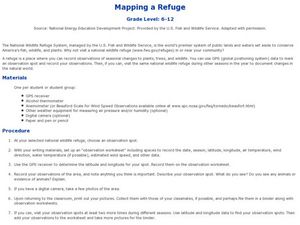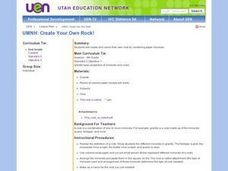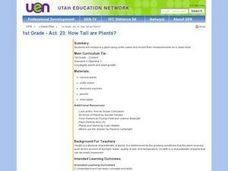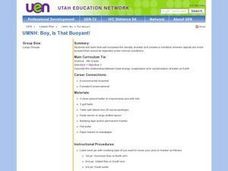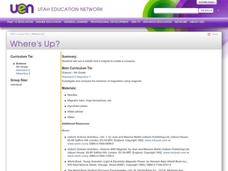Curated OER
What is in Soil?
Fourth graders identify and examine the components that make up soil. Individually, they use a magnifying glass to identify the organic and inorganic material in their soil sample. To end the lesson, they record the differences in the...
Curated OER
Was Goldilocks Telling the Truth?
Sixth graders explore the movement of heat between objects. In this heat lesson, 6th graders use the scientific method to conduct guided experiments regarding conduction, convection, and radiation.
Curated OER
Mapping a Refuge
Students record observations gathered while at a national wildlife refuge. For this lesson on wildlife refuges, students choose an observation spot and record seasonal changes throughout the year.
Curated OER
Getting To Know the Activists Among Us
Students discuss what it means to be an "activist." They identify various types of activist organizations and brainstorm the names of local people and organizations that might fit these categories. They research one of these...
Curated OER
Disease & Epidemics
Students investigate diseases and epidemics from a biological and social perspective. They analyze the management of disease, use and misuse of antibiotics and vaccinations, and development of new treatments.
Curated OER
Energy Audits for the Elderly
High schoolers perform experiments to determine the nature of energy particularly in air, light and water. They conducted an energy audit using the Energy Audit Checklist and by looking at the school's bills for gas and power.
Curated OER
Texas Recycles Day: A Sample School-Wide Environmental Event
Students participate in a recycles day. They research how recycling benefits the environment. They also compete in a paper products recycling contest.
Curated OER
Is It Lunar or Lunacy?
Sixth graders are introduced to the moon and its phases. Individually, they draw a sketch of each phase of the moon and read a short article about Galileo. To end the instructional activity, they examine the difference between...
Curated OER
Air Quality: Everyone's Responsibility
Students identify and interpret the causes of air pollution in their local community. They collect and analyze data to identify pollutants in the air and seek solutions to eliminate the contaminants in the atmosphere. Finally, students...
Curated OER
Create Your Own Rock!
Fourth graders create and name their own rock by combining paper minerals. They define rock and mineral, examine samples of minerals, and using colored scrap paper, arrange and glue the pieces of paper to represent a new mineral.
Curated OER
How Tall are Plants?
First graders measure a plant using unifix cubes and record their measurements on a class chart.
Curated OER
Will it Float?
First graders discuss why some things sink and some float after dropping a variety of items into water.
Curated OER
I Will Survive!
Fifth graders explain specialized structure and variation. They describe how some characteristics could give a species a survival advantage in a particular environment. They see how specialized structures and variations help species...
Curated OER
Boy, Is That Buoyant!
Fourth graders see that salt increases the density of water and creates a condition wherein objects are more buoyant than would be expected under normal conditions. They describe the relationship between heat energy, evaporation and...
Curated OER
Investigation 3 - What is Moonlight?
Third graders observe a demonstration explaining that the moon reflects sunlight in ordr to shine.
Curated OER
Sun or Shade?
Third graders use a thermometer to measure the air temperature in several places around the school and then graph the data. They grow 3 plants in different sunlight and record the growth.
Curated OER
Disguise! Disguise!
Third graders explore how some animals disguise or camouflage themselves as a form of protection.
Curated OER
'Water, Water Everywhere...'
Fourth graders explore how the Utah pioneers used irrigation to make the desert 'blossom as a rose'. They use geographical tools to analyze political and physical features of Utah, the United States, China, and Asia.
Curated OER
TE Activity: Cool Views
Students define preservation and conservation before listening to an article read by the teacher about John Muir and Gifford Pinchot, famous environmentalists. They complete a Venn diagram before deciding which side of this environmental...
Curated OER
What's In the Dirt?
Third graders watch a demonstration and write in their journals their predictions about how time might affect the moisture in the two paper towels. Using a Berlese funnel, they record their observations when it comes the amount of...
Curated OER
How Many? How Far? How Thick?
Fifth graders examine the role of magnetism and electricity. In groups, they are given different types of magnets and discover how the magnetic force differs for each one. They measure the amount of distance a paper clip moves toward...
Curated OER
What's Going to Happen at Any Given Barometer Reading?
Fourth graders brainstorm a list of words associated with weather. In groups, they sort the words into categories and observe the weather in their area for a month. To end the lesson, they compare the barometer measurements for a...
Curated OER
Where's Up?
Fifth graders brainstorm answers to the question why compasses point north. In groups, they use introduce the needle to the different ends of the magnet. They place the needles in a styroform disk and record their results in their...




